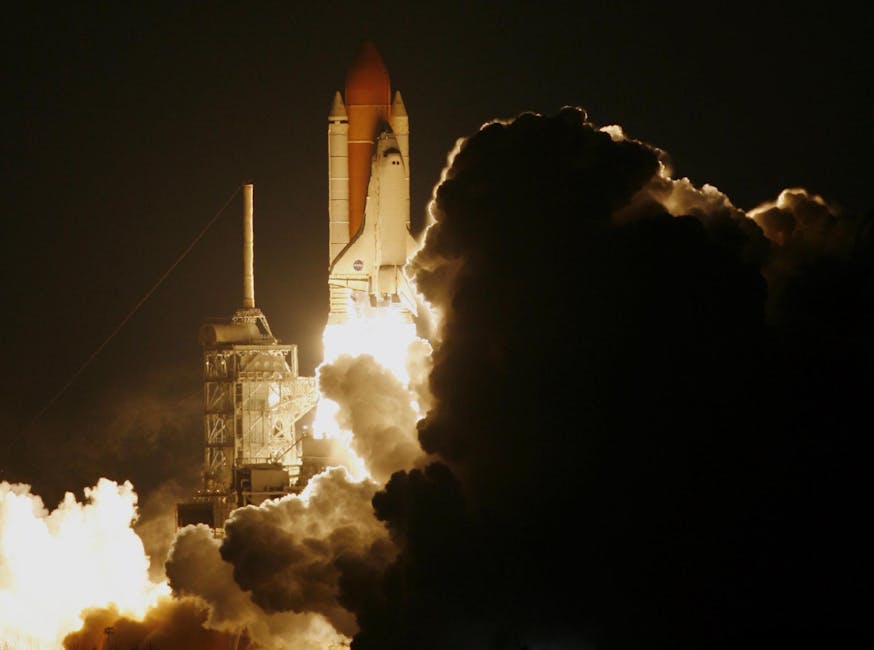The Future of Space Travel: Exploring the Final Frontier
Space exploration has always captured the imagination of humanity, fueling dreams of venturing beyond our planet and discovering the mysteries of the cosmos. From the early days of the Space Race to the groundbreaking achievements of modern space agencies and private companies, the future of space travel holds unprecedented potential and opportunities. In this article, we will delve into the various aspects shaping the future of space travel, from technological advancements to commercial space tourism, and explore the implications of humanity’s continued foray into the vast expanse of outer space.
The Evolution of Space Exploration

By Mikhail Nilov via Pexels
For centuries, humans have gazed up at the stars with wonder and curiosity, seeking to understand the universe beyond our own planet. The dawn of the Space Age in the mid-20th century marked a significant milestone in our quest to explore space, with the launch of the first artificial satellites and crewed missions to the Moon. Since then, space exploration has advanced rapidly, driven by technological innovation and the pioneering spirit of astronauts and scientists.
Today, space agencies such as NASA, ESA, Roscosmos, and CNSA continue to push the boundaries of space exploration, conducting missions to study Mars, Jupiter, and other celestial bodies in our solar system. The International Space Station (ISS) serves as a platform for international cooperation in space research, enabling astronauts from different countries to live and work in microgravity.
Furthermore, the rise of private space companies like SpaceX, Blue Origin, and Virgin Galactic has revolutionized the space industry, introducing new capabilities and opportunities for commercial space travel. Elon Musk’s ambitious plans to establish a human colony on Mars and Jeff Bezos’ vision of millions of people living and working in space reflect the growing interest in expanding humanity’s presence beyond Earth.
As we look towards the future, the next frontier of space exploration promises to be even more exciting and transformative, with new technologies and partnerships driving innovation in ways previously thought impossible.
Technological Advancements in Space Travel

By Pixabay via Pexels
One of the key drivers of the future of space travel is the rapid advancement of technology, enabling us to overcome the challenges of exploring and inhabiting space. From propulsion systems to life support systems, every aspect of space travel is being reimagined and improved to make long-duration missions and interplanetary travel a reality.
Advances in propulsion technology, such as ion engines and nuclear thermal propulsion, offer the potential for faster and more efficient spacecraft capable of reaching distant destinations in a fraction of the time currently required. Breakthroughs in materials science and additive manufacturing have led to the development of lightweight and durable spacecraft components, reducing the cost and complexity of space missions.
Moreover, the use of artificial intelligence (AI) and robotics is transforming the way we explore space, with autonomous rovers and drones being deployed on planetary surfaces to conduct scientific experiments and gather data. The integration of AI into spacecraft systems enables real-time decision-making and autonomous navigation, enhancing the safety and efficiency of space missions.
Furthermore, the emergence of 3D printing technology in space manufacturing opens up new possibilities for on-demand production of tools, spare parts, and even habitats using local resources. This capability could revolutionize the way we build and sustain human settlements on other planets, reducing our reliance on Earth for essential supplies.
Overall, the convergence of these technological advancements is paving the way for a new era of space exploration, where humans will have the ability to travel farther, stay longer, and achieve more ambitious goals in the cosmos.
Commercial Space Tourism: A New Frontier

By RDNE Stock project via Pexels
While space exploration has traditionally been the domain of government agencies and astronauts, the rise of commercial space tourism is democratizing access to space and opening up new possibilities for private individuals to experience the wonders of spaceflight. Companies like SpaceX, Blue Origin, and Virgin Galactic are leading the way in developing commercial space travel services for tourists, researchers, and astronauts.
SpaceX’s Crew Dragon spacecraft, for example, is capable of carrying up to seven passengers to the ISS for short-duration missions, providing opportunities for civilians to experience life in space firsthand. Blue Origin’s New Shepard suborbital vehicle offers a brief but exhilarating journey to the edge of space, allowing passengers to experience weightlessness and see the curvature of the Earth from space.
Virgin Galactic’s SpaceShipTwo takes a different approach, offering a suborbital spaceflight experience that includes a few minutes of weightlessness and panoramic views of the Earth below. With celebrities, billionaires, and space enthusiasts already signing up for commercial spaceflights, the demand for space tourism is expected to grow in the coming years.
However, the commercial space tourism industry faces challenges such as high costs, safety regulations, and environmental concerns that must be addressed to ensure the sustainable growth of this emerging sector. As companies continue to innovate and expand their offerings, the future of space tourism holds promise for making space travel accessible to a broader audience and inspiring the next generation of space explorers.
Sustainability and Space Exploration

By T Leish via Pexels
As humanity ventures further into space, the need for sustainable practices and environmental stewardship becomes increasingly important to ensure the long-term viability of space exploration. The accumulation of space debris in Earth’s orbit poses a significant risk to spacecraft and satellites, threatening the safety of astronauts and the integrity of critical infrastructure in space.
To address this challenge, space agencies and organizations are exploring innovative solutions such as active debris removal, on-orbit servicing, and space traffic management to mitigate the impact of space debris on future missions. By monitoring and tracking debris in space, we can better understand the dynamics of orbital debris and develop strategies to prevent collisions and minimize the generation of new debris.
Furthermore, the sustainable use of resources in space is essential for supporting long-duration missions and human habitation on other planets. Technologies like in-situ resource utilization (ISRU) enable astronauts to extract and utilize resources from planetary surfaces, such as water, oxygen, and metals, to reduce the need for resupply missions from Earth.
By leveraging local resources and recycling waste products in space, we can create a closed-loop system that minimizes the environmental impact of human activities and maximizes the efficiency of space exploration missions. Sustainable practices in space exploration not only benefit the environment but also contribute to the overall success and longevity of human presence in space.
The Ethics of Space Exploration
As we embark on ambitious missions to explore space and colonize other planets, ethical considerations become paramount in guiding our actions and decisions. The prospect of terraforming Mars, for example, raises questions about our responsibility to preserve the natural environment of celestial bodies and protect indigenous life forms that may exist there.
Furthermore, the commercialization of space and the privatization of space resources raise concerns about equity, access, and ownership in space. Who has the right to exploit the resources of celestial bodies, and how can we ensure that the benefits of space exploration are shared equitably among all nations and individuals?
Issues of space governance, space law, and international cooperation become increasingly complex as more countries and private entities participate in space activities. The need for transparent and inclusive policies to regulate space exploration and commercial activities is essential to prevent conflicts, ensure compliance with international treaties, and promote peaceful cooperation in space.
Ethical considerations also extend to the treatment of human astronauts and space tourists, ensuring their health and safety are prioritized during missions, and their rights and dignity are respected in the harsh environment of space. As we venture deeper into space, it is essential to uphold ethical principles and values that reflect our commitment to responsible exploration and the well-being of all individuals involved in space travel.
Expert Opinions: Perspectives on the Future of Space Travel
Leading experts in the field of space exploration offer valuable insights and perspectives on the future of space travel, highlighting the challenges and opportunities that lie ahead. Dr. Ellen Stofan, former Chief Scientist at NASA, emphasizes the importance of international collaboration in advancing space exploration and addressing global challenges such as climate change and resource scarcity.
According to Dr. Mae Jemison, the first African American woman in space, diversity and inclusion are essential for driving innovation in space exploration and inspiring the next generation of astronauts and scientists. Dr. Jim Green, NASA’s Chief Scientist, envisions a future where humans will establish a sustainable presence on Mars and other celestial bodies, unlocking the potential for scientific discovery and technological innovation.
These expert opinions underscore the transformative nature of space exploration and the profound impact it can have on society, the economy, and the environment. By harnessing the collective expertise and creativity of the global space community, we can overcome the challenges of space travel and realize the full potential of humanity’s journey into the cosmos.
Common Misconceptions About Space Travel
Despite the advancements in space exploration and the growing interest in commercial space tourism, there are several common misconceptions about space travel that persist in the public consciousness. One of the most prevalent myths is that space is empty and devoid of resources, making it inhospitable for human life.
In reality, space is filled with valuable resources such as water, metals, and minerals that can be extracted and utilized for sustaining human settlements and supporting future missions. Technologies like ISRU and asteroid mining enable us to tap into these resources and establish self-sustaining colonies on other planets.
Another misconception is that space travel is only accessible to highly trained astronauts or wealthy individuals, excluding the majority of the population from experiencing spaceflight. With the advent of commercial space tourism and advancements in spacecraft technology, the barriers to entry for space travel are gradually lowering, making it more accessible and affordable for a wider range of people.
By debunking these misconceptions and promoting a more accurate understanding of the possibilities and challenges of space travel, we can inspire greater interest and engagement in space exploration and encourage more diverse participation in shaping the future of humanity’s journey into space.
Conclusion: Embracing the Challenges and Opportunities Ahead
In conclusion, the future of space travel holds immense promise and potential for expanding our horizons, pushing the boundaries of human exploration, and unlocking the mysteries of the universe. From technological advancements to commercial space tourism, sustainability practices to ethical considerations, the evolution of space exploration is shaping a new era of discovery and innovation.
As we navigate the challenges and opportunities ahead, it is essential to embrace a collaborative and inclusive approach to space exploration, fostering international cooperation, diversity, and ethical principles that guide our actions and decisions in space. By harnessing the power of technology, science, and human ingenuity, we can overcome the obstacles of space travel and pave the way for a future where humanity’s presence in the cosmos is sustainable, equitable, and inspiring.
To wrap things up, the future of space travel is a journey of exploration, discovery, and transformation that invites us to imagine a world where the stars are within reach, and the wonders of the universe are ours to explore. As we embark on this incredible adventure, let us move forward with curiosity, courage, and a shared vision of a future where the final frontier is not just a destination but a home for all who dare to dream.




